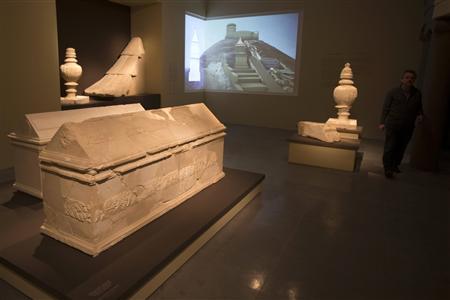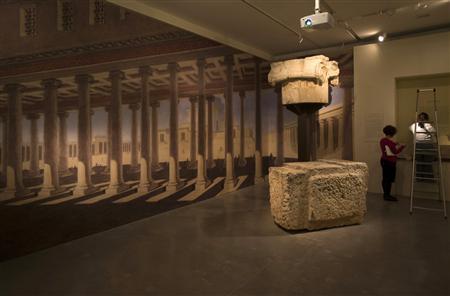 |
| The exhibition “Herod the Great: The King’s Final Journey” includes a reconstruction of his tomb, with his sarcophagus, center. Jim Hollander/European Pressphoto Agency |
"Hamdan Taha, director of the Palestinian Authority’s department of
antiquities and cultural heritage, said that while Oslo provides for
Israel’s excavation in the West Bank, exhibiting the material was
another story. He complained that the Palestinians were never consulted
about the project, which he called “an aggression against Palestinian
cultural rights in their own land,” and said it would “not help to
reconstruct peace between the Palestinians and Israel.”"
http://www.nytimes.com/2013/02/14/world/middleeast/israel-museums-herod-show-draws-anger-over-use-of-west-bank-objects.html?ref=global-home
By JODI RUDOREN
Published: February 13, 2013
JERUSALEM — In one room sits a sarcophagus of reddish-pink limestone believed to have held the body of King Herod, painstakingly reconstructed after having been smashed to bits centuries ago. In another, there are frescoes from Herod’s elaborate underground palace, pieced together like a jigsaw puzzle. Throughout, elaborate animated videos show the king’s audacious construction — atop the desert fortress Masada; at his burial place, Herodium; and his most famous work, the Second Temple of Jerusalem.
The Israel Museum on Tuesday opened its most ambitious archaeological exhibition and the world’s first devoted to Herod, the lionized and demonized Rome-appointed king of Judea, who reigned from 37 to 4 B.C.E. and is among the most seminal and contentious figures in Jewish history. But the exhibition, which the museum director described as a “massive enterprise” that involved sifting through 30 tons of material from Herodium and reconstructing 250 artifacts, has also brought its own bit of controversy.
The Palestinian Authority
says the exhibition is a violation of international law because much of
its material was taken from near Bethlehem and Jericho, both in the
Israeli-occupied West Bank. An Israeli group of archaeologists and
activists complains that the museum, however unwittingly, is helping the
Jewish settlement movement advance its contention that the West Bank
should be part of Israel and not a Palestinian state.
“What the Israel Museum is doing is like coming and saying, ‘Listen, the
heritage of the West Bank is part of our heritage first of all,’ ” said
Yonathan Mizrachi, an archaeologist who helped found the Israeli group,
Emek Shaveh,
in 2009. “It’s part of the idea to create the narrative that those
sites, no matter what the political solution,” are “part of the Israeli
identity.” ....READ MORE







